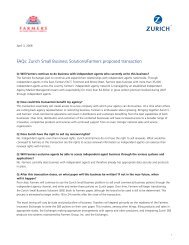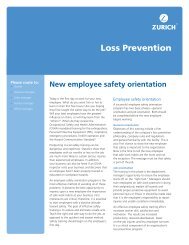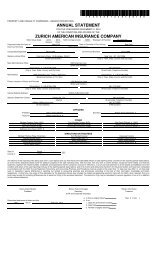• Expressly stating that <strong>the</strong> indemnification rights constitute a contract, areintended to be retroactive to events occurring prior to <strong>the</strong>ir adoption and shallcontinue to exist after <strong>the</strong> rescission or restrictive modification of <strong>the</strong> provisionwith respect to events occurring prior to that rescission or modification.Alternatively, a separate indemnification contract could be executed by <strong>the</strong>corporation and <strong>the</strong> director or officer.• Expressly stating that any director or officer who serves on behalf of asubsidiary of <strong>the</strong> corporation or any employee benefit plan of <strong>the</strong> corporationor such subsidiary is deemed to be providing such service at <strong>the</strong> request of<strong>the</strong> corporation. Thus, a director or officer of a subsidiary will be entitled toindemnification from both <strong>the</strong> subsidiary and <strong>the</strong> parent company.• Requiring indemnification of expenses incurred by a director or officer as a plaintiffin a suit only if <strong>the</strong> board of directors approves prosecution of <strong>the</strong> suit by <strong>the</strong>director or officer.2. Gaps in protection under indemnification statutesThere are a number of obvious gaps in <strong>the</strong> protections afforded to directors by stateindemnification statutes:• Most state indemnification statutes permit indemnification only if <strong>the</strong> director’sor officer’s conduct was in good faith and he or she reasonably believed that <strong>the</strong>conduct was in <strong>the</strong> best interests of <strong>the</strong> corporation or at least not opposed to<strong>the</strong> corporation’s best interests. In <strong>the</strong> case of criminal proceedings, <strong>the</strong> director orofficer must have had no reasonable cause to believe <strong>the</strong> conduct was unlawful.Conduct violating <strong>the</strong>se standards may not be indemnified.• Most state indemnification statutes prohibit indemnification of settlements andjudgments in claims by or on behalf of <strong>the</strong> corporation, including shareholderderivative lawsuits.• Even with respect to defense costs incurred in derivative lawsuits,indemnification is not permitted under most state statutes if <strong>the</strong> director orofficer is adjudged liable to <strong>the</strong> corporation, unless and only to <strong>the</strong> extent acourt determines that <strong>the</strong> defendant director is fairly and reasonably entitled toindemnification for <strong>the</strong> expenses.• The appropriate decision-making body (<strong>the</strong> board, <strong>the</strong> shareholders orindependent legal counsel) may be unable or unwilling to conclude that <strong>the</strong>director has met <strong>the</strong> required standard of conduct. This may be a particularproblem if control of <strong>the</strong> institution has changed hands or <strong>the</strong> facts as to <strong>the</strong>individual’s conduct are in dispute.• The SEC takes <strong>the</strong> position that indemnification by a corporation of directors,officers or controlling persons against liabilities arising under certain of <strong>the</strong> federalsecurities laws is against public policy and unenforceable. The SEC argues that<strong>the</strong> purpose of <strong>the</strong> securities laws is, at least in part, to provide deterrence againstnegligence and o<strong>the</strong>r misconduct by directors and officers, and that this deterrenteffect would be reduced or eliminated if <strong>the</strong> directors and officers could beindemnified. This position has been upheld by many courts.25Financial institutions guide
• An institution may be insolvent or o<strong>the</strong>rwise unable to make indemnification.• Existing and proposed federal regulations may restrict indemnification. Forexample, under <strong>the</strong> current regulations of <strong>the</strong> Comptroller of <strong>the</strong> Currency,indemnification for civil money penalties is prohibited.Directors’ & officers’ liability insuranceD&O liability insurance provides a substantial measure of protection against <strong>the</strong>gaps in corporate indemnification, including coverage for most judgments andsettlements in derivative actions and protection when <strong>the</strong> institution is not permittedor financially unable to indemnify its directors. This section will briefly describe D&Oinsurance policies and <strong>the</strong> protections <strong>the</strong>y generally offer.D&O policies issued by different insurance companies differ widely in <strong>the</strong>ir coverage.In most cases, directors should ensure that a qualified broker, counsel, risk manageror o<strong>the</strong>r expert is involved to critique <strong>the</strong>ir D&O insurance program and assist inimproving <strong>the</strong> protection afforded by that program.“Most D&O policies offer atleast two forms of coverage.The first, referred to as <strong>the</strong>personal, direct, or “Side-A”coverage, provides coverage forclaims made against individualdirectors and officers for lossesthat are not indemnified by <strong>the</strong>company. The second form ofcoverage, referred to as <strong>the</strong>corporate reimbursement, or“Side-B” coverage, providesreimbursement for sums<strong>the</strong> company incurs in itsindemnification of loss incurredby <strong>the</strong> directors and officers.”1. Basic features of D&O policiesD&O policies are “claims made” policies, which means that <strong>the</strong>y cover claims firstmade during <strong>the</strong> policy period, whe<strong>the</strong>r <strong>the</strong> alleged wrongdoing occurred during orbefore <strong>the</strong> policy period. Therefore, it is important for corporations to maintain highqualityD&O policies for many years after a director’s or officer’s service ends, as coveragefor <strong>the</strong> former director or officer will be determined based on <strong>the</strong> policy in existencewhen <strong>the</strong> subsequent claim is made, and not when <strong>the</strong> alleged wrongdoing occurred.Most D&O policies offer at least two forms of coverage. The first, referred to as <strong>the</strong>personal, direct, or “Side-A” coverage, provides coverage for claims made againstindividual directors and officers for losses that are not indemnified by <strong>the</strong> company.The second form of coverage, referred to as <strong>the</strong> corporate reimbursement, or “Side-B”coverage, provides reimbursement for sums <strong>the</strong> company incurs in its indemnificationof loss incurred by <strong>the</strong> directors and officers. Both forms of coverage apply only to lossincurred by <strong>the</strong> directors and officers in claims made against <strong>the</strong> directors and officers.Although both types of coverage are contained in <strong>the</strong> same insurance policy, each willbe set forth in a separate insuring clause and each will be subject to different retentions,and perhaps exclusions.Many D&O policies can also cover <strong>the</strong> institution’s liability to third parties in connectionwith certain types of claims against it for its own alleged misconduct. Unless a D&Opolicy explicitly covers <strong>the</strong> institution’s liability to third parties, an institution will notbe entitled to coverage under its D&O policy, except with respect to its obligation toindemnify its directors and officers.2. Self-insured amounts and policy limitsNormally, a D&O policy will include a retention (<strong>the</strong> amount <strong>the</strong> insureds must paybefore <strong>the</strong> insurer’s obligations attach) under <strong>the</strong> Company Reimbursement (Side-B)coverage for loss <strong>the</strong> institution is required or permitted to pay as indemnification.A different self-insured retention may apply with respect to <strong>the</strong> institution’s ownliability to third parties, or to o<strong>the</strong>r specific types of claims. Typically, D&O insurers do26Financial institutions guide
















